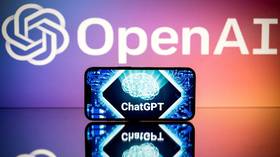Musk sues ChatGPT maker over AI threat
OpenAI has morphed into a subsidiary of Microsoft, the billionaire entrepreneur argued
US billionaire Elon Musk has taken OpenAI, the artificial intelligence research company he once helped to found, to court over an alleged breach of its original mission to develop AI technology not for profit but for the benefit of humanity.
OpenAI, founded in 2015 as a non-profit research lab to develop an open-source Artificial General Intelligence (AGI), has now become a “closed-source de facto subsidiary of the largest technology company in the world,” Musk’s legal team wrote in the suit filed on Thursday in San Francisco Superior Court.
The lawsuit claimed that Musk “has long recognized that AGI poses a grave threat to humanity – perhaps the greatest existential threat we face today.”
“But where some like Mr. Musk see an existential threat in AGI, others see AGI as a source of profit and power,” it added. “Under its new board, it is not just developing but is actually refining an AGI to maximize profits for Microsoft, rather than for the benefit of humanity.”
Musk left the OpenAI board of directors in 2018 and has since grown critical of the firm, especially after Microsoft invested at least $13 billion to obtain a 49% stake in a for-profit branch of OpenAI.
“Contrary to the founding agreement, defendants have chosen to use GPT-4 not for the benefit of humanity, but as proprietary technology to maximize profits for literally the largest company in the world,” the suit read.
The lawsuit listed OpenAI’s CEO Sam Altman and president Gregory Brockman as co-defendants in the case, and called for an injunction to block Microsoft from commercializing the tech.
AI technology has improved at a rapid pace over the last two years, with OpenAI’s GPT language model going from powering a chatbot program in late 2022 to performing in the 90th percentile on SAT exams just four months later.
More than 1,100 researchers, tech luminaries and futurists argued last year that the AI race poses “profound risks to society and humanity.” Even Altman himself has previously acknowledged that he is “a little bit scared” of the technology’s potential, and barred customers from using OpenAI to “develop or use weapons.”
However, the company ignored its own ban on the use of its technology for “military and warfare” purposes and partnered up with the Pentagon, announcing in January that it was working on several artificial intelligence projects with the US military.
You can share this story on social media:









Comments are closed.